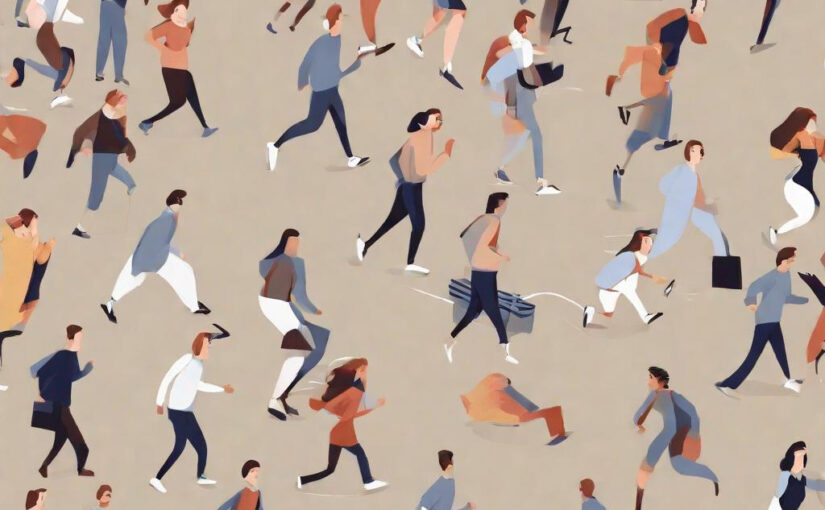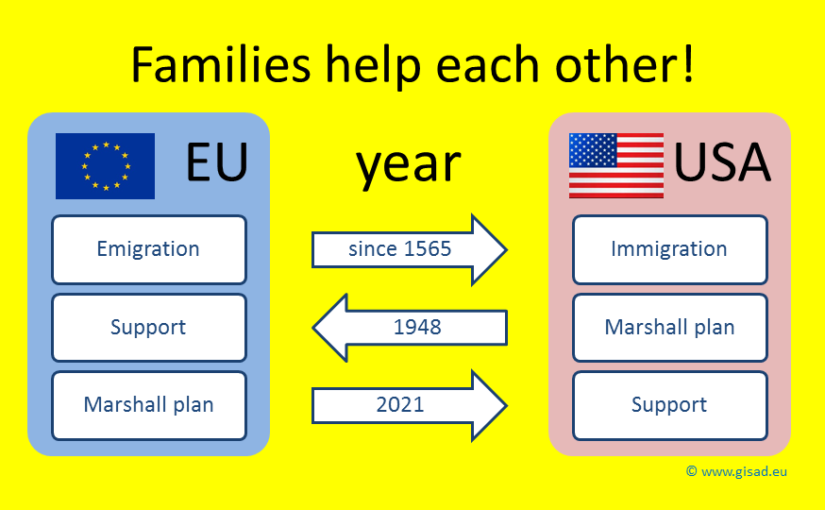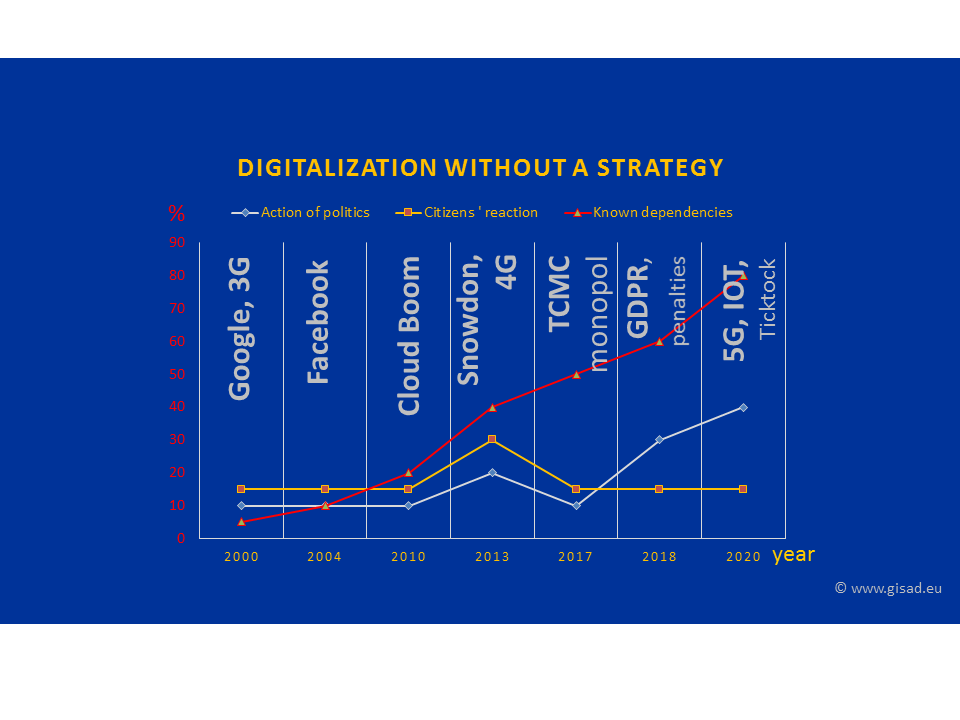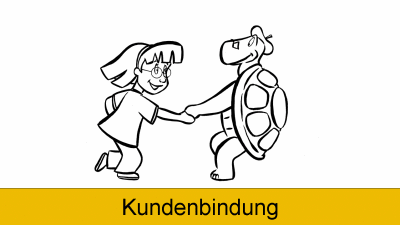Families stick together. A “We feeling” unites us. If things go particularly well, this will result in family businesses that expand over many generations. Families sometimes argue, but ultimately they support each other when it comes to threats from the outside. We transfer the feeling in the small to the society on the big. Here, too, we act, shaped by our ancestors and with the desire to leave something to our descendants.
It was probably also the family ties of descent, which after the Second World War led to the fact that the mostly European-rooted American did not want to suppress their relatives, but in a Marshall plan made a decisive contribution to post-war construction.
In recent years, the children of Europe have increasingly embarked on a disruptive path. They have not only destroyed companies in the scope of digitalisation, but have increasingly divided their families, divided them into political camps to the point that they could no longer talk to each other. This divide Biden will not be able to lift without the help of Europe.
It is not least thanks to the great success of the Marshall Plan that we Europeans do not question the American path but continue to seek orientation in the USA until today. This became very vivid in the “Deutsches Wirtschaftsforum digital” on three days in the first week of November. Outstanding contributions analysed the actual differences between the US and Europe: “Half of Americans want to carry weapons and feel health insurance is a restriction of freedom. The individual is more important than the family. The high inheritance tax is not geared to the preservation of family businesses.”
The theme of the event was: “Democracy and the digital economy – the European path.” I found it incomprehensible why there were invited a majority of non-European speakers to the topic of AI. For example, the Radboud University Nijmegen has been teaching AI for 30 years. All Global Player contributions were out of place. Regardless of whether it was a Chinese, American or European international technology company, the answers were similar: “You make the rules and we build them in”. Such a result is then a little authoritarian Chinese, disruptively American and contains only the absolute necessary European guidelines. The Economic Forum has correctly presented the problems, but has not been able to show the prospect of its own European path.
To make rules for all those involved in the digital economy is to make the third step before the first step. In the beginning it is necessary to define how pre-digital democratic achievements can be transferred to a digital society for an own European infrastructure in solid craftsmanship and not destructively. For this I wrote a draft for a Marshall Plan and focused on three goals:
- The optimal processing and easy utilisation of digital data, while maintaining diversity and performance-adopted integration of all parties involved in the value creation.
- The stigmatisation-free, lifelong digital involvement of all citizens with incentives for self-development.
- Digitally guaranteeing the necessary state tasks to preserve the security of citizens, the economy and the state, while maintaining pre-digital democratic achievements.
In a second step, these goals must be adapted to the current challenges of the Western world. The Marshall Plan has to answer three questions:
- How can Europe take responsibility for its own security?
- How can a division between families, between social groups, and in the Western world be avoided or even lifted?
- How do we use the Corona crisis as an opportunity to build a Western digital economy?
At present, the security debate is mainly about the expansion of classic weapon systems. For someone like me who has been fighting unfair measures by the data-users for 20 years, it is very unlikely that we will go to a conventional war again. Who would do that and what advantage would it have? It is much easier and, above all, undetectable to attack people, groups or even industries by a virus. We can stand up for Europe’s security by introducing an infrastructure in which every citizen can protect himself and his or her data. I have proposed such an infrastructure in the form of an EU-D-S (European digital system) of the European Commission. Since primarily defined open standards and some technical procedures are introduced, the EU-D-S would be transferable to the US. This own contribution to security would not cost Europe a cent if we were to bring back the digital value ceation, in particular from American companies. I have given detailed statements on the further synergy effects at http: //gisad.eu/statements/.
Europe has just agreed on a procedure for respecting the rule of law. It can speak with one voice. Now Europe must respond quickly to the challenge of the Corona crisis. Even if a quick vaccination succeeds, we will not be able to return to our old habits before Christmas 2021. Many new habits and changes will remain. The next year will suffice to divide Europe too, unless there is a new perspective for all Europeans quickly. The social fabric is changing. While so far a relatively steadily growing prosperity offered the social cement, Corona reshuffled the cards. On the one hand, there are winners who can sit out the crisis in the home office and others who are now forced daily to expose themselves to the risk of contagion. There are entire industries receiving artificial respiration by state support, but with a longer-lasting pandemic, they have no chance of recovery. A state can compensate for losses resulting from the pandemic, but not for social distortions caused by people losing their social frame of reference through the pandemic. Short-time worker money works for a few weeks. However, where work cannot be outsourced to the home office, the daily routine disappears. There is a lack of the task by which one has defined oneself. Frustration and fear of an indefinite future are increasing.
The pandemic intensifies digital misdevelopments. Social media programs have not been developed to increase democratic, social cohesion. The content generated by the users has the only purpose to serve as a carrier for advertising. Thus, phenomena such as fake news were not taken into account in business models. They do not attach importance to self-determined users. These false digitalisation concepts support the natural laziness of people. (I found no equivalent for the German word “Bequemlichkeit”. “comfort”, “amenity”, “ease”, “accommodativeness” and “convenience” are too positively occupied, “laziness” too negative. So I will use laziness.)
What happens when only the third step of regulation has been made without making the first two steps, a 80-year-old relative has once again impressively demonstrated to me at the weekend. For several years she has been reading her e-mails on her tablet. Now it was about a PDF attachment for which the corresponding PDF reader was missing. Supervised by me via phone, multiple attempts to get an app ended on pressing advertising instead of the installation process. There are also problems with the feed reader I had installed just before. For most posts, you first have to accept cookies in popups. Advertisements are positioned in such a way that you accidentally click on them. That’s a total overload for someone who’s been reading from top to bottom all his life. The GDPR has only contributed to the user’s data protection to the extent that my relative has now completely renounced digital newspaper reading and has subscribed to a print newspaper again. Integration of old people looks different.
The digital echo chambers aim at the convenience of people. Those who were never expected to participate in decisions do not see any sense in the critical reflection of information. They are looking for like-minded people on social media that they are perceived by. For example, continued support for Republicans depends substantially on socially forgotten groups, which Trump has given the feeling of representing their interests.
An EU-D-S must not only provide security to people, but must integrate them into a permanent democratic process. This integration must be so simple and self-evident that everyone can participate in it. My relative lives alone. Together with others, she could make valuable contributions to the digital society if she could contribute according to her capability. That would help her, too. Everyone wants to be a valuable part of society. If we have an EU-D-S with such an integration possibility, we will achieve such a high proportion of society, which can be built on this basis of numerous new value creation concepts. Then the users will also pay monthly contributions for information. However, I think individual newspaper subscriptions are outdated. If you have learned to evaluate different media via a feed reader, you won’t pay to restrict yourself to only one medium. Alternatively, an EU-D-S would allow an author levy per read article, which could be paid by the user over a staggered monthly price. Anyone who has exceeded a certain monthly reading quantity, adds further contributions, advertising-free of course. Advertising should work in the pull principle. In a global category standard, each user could determine to which categories he wants to receive advertising. It is important that advertising becomes a user-controlled process. Our goal must be to take everyone into the digitalisation process. If everyone were to participate in the EU-D-S, there would also be solutions for financing artistic digital offerings. The current social media structures are directed against diversity. Sick information is suitable for a Shitstorm or for getting acquainted with only some influencers. This is due to processes that lead all users to the first result of a page and thus prefer those who made it to the first page. If all content is randomly presented and condensed digitally to a group of evaluators, all content has the same chance of being perceived. If every European city can recommend a regionally based and successful startup bottom-up to other cities, startups in Europe also have a real chance. Startups don’t need money in the first place, they need perception. It is difficult to achieve this at a time when the focus is exclusively on the US and China. How are new concepts to prevail if information structures of competition need to be used for dissemination? For a successful Europe, the basic structure for disseminating information must be general good.
The EU-D-S must provide an overall societal approach in which critical citizen participation in the evaluation of content is an integral part of a lifelong integration strategy for all EU citizens.
Even if this civil rights infrastructure is provided free of charge to every EU citizen, it will only be successful if there are incentive systems to leave the path of habit. There must be a social promise of integration for all those who participate. Society should expect a (small) digital return for any crisis support from the state.
An EU-D-S cannot be introduced overnight. Today it is about a realistic vision of the future against pandemic depression, which offers a perspective for those who are particularly affected by Corona. Tremendous forces can be released if all EU citizens move in the same direction!








